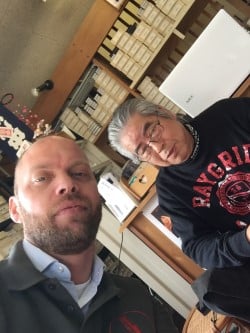We will be closed from Wednesday 19 March to Friday 28 March
- Knives
- Tools
- Engraving
- Giftcards
- Book
- Sharpening Box
- Shop
- Workshop
- Info
Your cart is currently empty
Gyuto • 210 mm • stainless san mai • western pakka • Aogami super • Kurouchi • for both right and left hand use
A classic gyuto, even with using the pinch grip, this knife is easy to control. Completely made by hand, a raw look and an extremely thin and razor sharp finish. Recommended to professionals and experienced home cooks.
Thinned by hand on the Kaiten Toshi ( Japanese water wheel ) and finished with a micro bevel for extreme sharpness. The thin san mai blade is constructed out of three layers: stainless on the outside and a core of the high end traditional Aogami super steel. Enjoy a high end carbon knife, with the maintanance of a stainless knife. The kurouchi finish gives the knife a dark and spooky character. The edge is super sharp and delicate cutting in the beginning is advised. The hammered tsuchime finish on this blade gives the knife its raw identity.
Kurouchi is not a type of knife but rather a traditional, rustic finish. Kurouchi roughly translates as blacksmith’s finish. Kurouchi knives retain the scaly residue left from the forging process. The finish reduces reactivity on carbon steel knives, lowers the cost of production, and gives the knife a very characterful, rustic look prized by many knife enthusiasts.
This traditional steel is not named after its colour, but named after the colour of its paper wrapping, in which it is stored in the Hitachi steel factory in Japan. There are three different grades: super, #1 en #2. Blue steels use a high grade of carbon, chrome and vanadium added in their alloy. Aogami super even added extra tungsten. Aogami super is here " Best of both worlds" Blue #1 is for sharpness, Blue #2 for toughness. Blue steels are mostly seen in deba or usuba knives, white steels often in yanagibas. Aogami super is regarded as one of the best traditional steels by Japanese knifemakers, but difficult to work with. Blue steels are difficult to sharpen on a whetstone, but they remain sharp for a longer period, compared to white steels.
In 2019 Fujiwara knives have celebrated their 150 years of craftmanship, nowadays run by president Kojiro san, who is the 4th generation owner of this family business. Forging still in a traditional and authentic way, similar to his ancestors, who were forging katanas, the Japanese swords. By improving this process, but maintaining to traditional knife making, his knives are nowadays comparably as sharp or even sharper, as swords in the past. Fujiwara is well known for its robust knives. Maybe not the flawless finish as you can expect in this range, but this inferior finish has a name in Japanese: wabi sabi.
In 2018 I've met Kojiro san in person in his small workshop in Tokyo. Star strucked as I was, I forgot how to speak... "Are you gonna introduce yourself?" my wife asked. Social media can influence your expectations. Of course I had a reality check and Koijiro san is a very normal and approachable knife maker, actually a joker as he was joking with my wife the whole time. Side by side we have worked for a day in his small workshop near his home, finishing handles and sharpening blades. Kojiro san is a passionate craftsman and a 4th generation owner of a family business. This day I learned about tradition, craftmanship and Japanese history of knifemaking and built a foundation for a long lasting business relationship. Arigato Gozaimasu Kojiro san.
